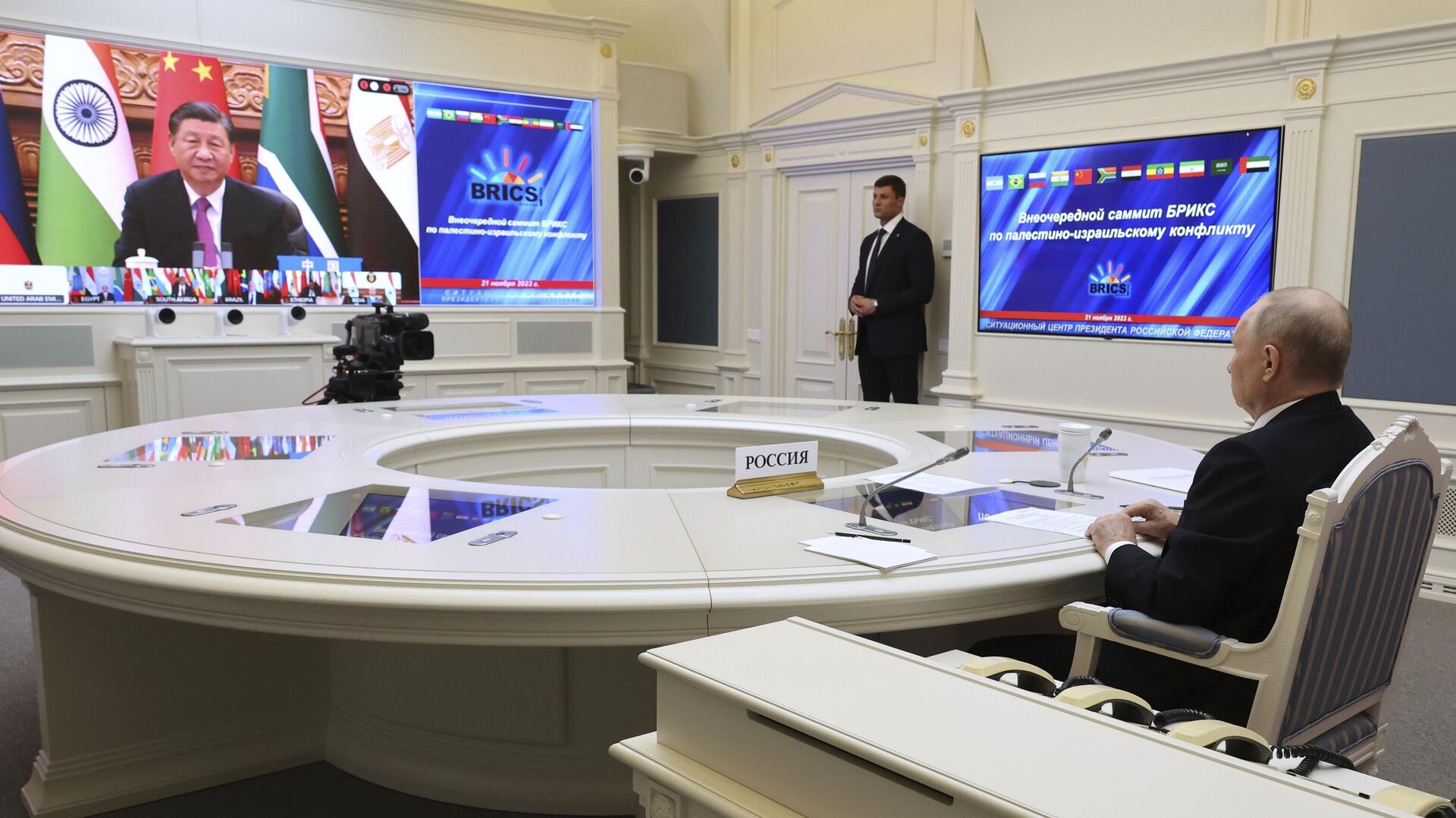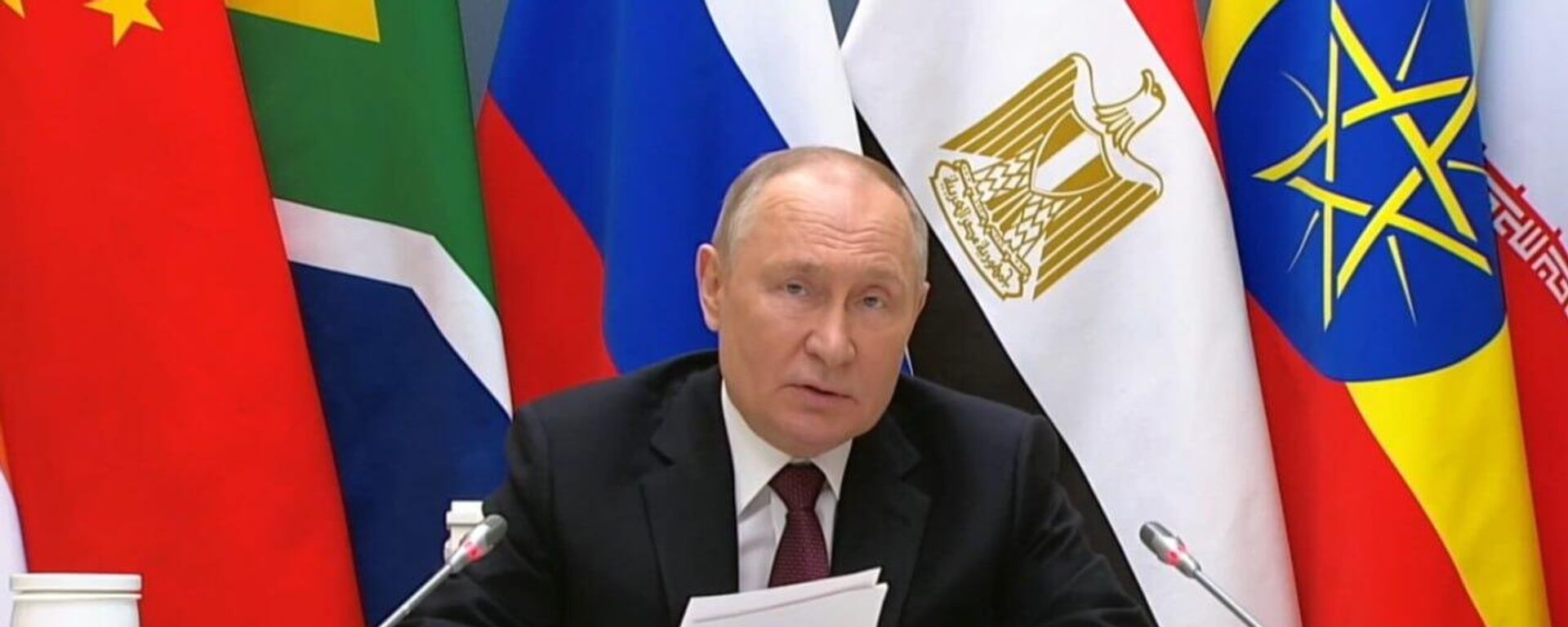https://sputniknews.in/20231122/how-does-brics-intervention-in-israel-hamas-conflict-challenge-us-hegemony-5530429.html
How Does BRICS Intervention in Israel-Hamas Conflict Challenge US Hegemony?
How Does BRICS Intervention in Israel-Hamas Conflict Challenge US Hegemony?
Sputnik India
In a show of solidarity, the BRICS nations have expressed serious concerns over the “grave deterioration” of the situation in Gaza and the dire humanitarian crisis engulfing the Palestinian enclave.
2023-11-22T15:27+0530
2023-11-22T15:27+0530
2023-11-22T15:27+0530
israel-hamas war
israel
india
us
brics
european union (eu)
hamas
vladimir putin
xi jinping
ebrahim raisi
https://cdn1.img.sputniknews.in/img/07e7/0b/16/5532858_0:161:3071:1888_1920x0_80_0_0_b2dca3658bfd1d8890b08177da7515f4.jpg
The ‘Chair’s Summary’ released by South African President Cyril Ramaphosa after the BRICS' ‘Extraordinary Joint Meeting’ on the situation in the Middle-East on Tuesday underlined the unanimous condemnation of the 11 BRICS nations on the growing civilian death toll, which has crossed 13,000.The virtual meeting was attended by Russian President Vladimir Putin, Chinese President Xi Jinping, Iranian President Ebrahim Raisi, Saudi Arabia’s Prime Minister and Crown Prince Mohamed Bin Salman and Indian foreign minister S Jaishankar, who was representing Prime Minister Narendra Modi, among others.Importantly, the grouping also stressed upon tne importance of establishing an independent and sovereign Palestine as a long-term solution to the festering Middle-East dispute.Importantly, the BRICS nations have unanimously endorsed the role of United Nations Security Council (UNSC) in maintaining international peace and security, amid reservations by Russia about US’ unilateral approach to the current conflict.Why is BRICS’ Intervention Critical?Rajiv Bhatia, a former Indian diplomat and a Distinguished Fellow at Mumbai-based think tank Gateway House, told Sputnik India that the BRICS states have always taken a “keen interest” in the developments in West Asia, evidenced from references to the situation in the region in the past joint statements.The veteran diplomat noted that the BRICS wanted its “combined view” on the Israel-Palestine conflict to be “reckoned with”.The former Indian Ambassador opined that as things stood now, the US and EU held more “leverage” over Israel than the other nations. “But the more these powers from outside the region gather together, the more influence they could assert,” he predicted.Bhatia noted that the “western-orientation” to resolve the Palestine problem was quite “pro-Israel”.The ex-Ambassador highlighted that that the BRICS’ communique issued after the meeting has been unanimous on at least two broader points.Significantly, the BRICS meeting was held against the backdrop of visits of a joint ministerial committee of Arab League and Organisation of Islamic Cooperation (OIC) to Beijing and Moscow, in a bid to garner support for a ceasefire by the Islamic nations.Reports suggest that the Arab-OIC ministers will pay a visit to India in coming days as well.India’s Position on Israel-Hamas WarDuring his address at the BRICS’ meeting, Jaishankar reiterated India’s condemnation of the Hamas’ “terrorist” attack”, which he blamed for triggering the “immediate crisis”.At the same time, the top Indian diplomat condemned the civilian deaths and urged “restraint” on part of the warring parties, including Israel.Bhatia noted that there were “nuances of differences” among positions of India and other BRICS’ states in the communique, which have been viewed as being more critical of Israel and described the inability to address the question of two-state solution as the “root cause” of the conflict.However, he stressed that BRICS’ nations, on the whole, have exhibited a unified stance on the issue.
https://sputniknews.in/20231121/us-trying-to-monopolize-mediation-efforts-for-palestinian-israeli-truce-putin-5523310.html
israel
india
us
saudi arabia
iran
global south
Sputnik India
feedback.hindi@sputniknews.com
+74956456601
MIA „Rossiya Segodnya“
2023
Dhairya Maheshwari
https://cdn1.img.sputniknews.in/img/07e6/0c/13/138962_0:0:641:640_100x100_80_0_0_2cb44360dbcdf6d84bf4b299cd045917.jpg
Dhairya Maheshwari
https://cdn1.img.sputniknews.in/img/07e6/0c/13/138962_0:0:641:640_100x100_80_0_0_2cb44360dbcdf6d84bf4b299cd045917.jpg
News
en_IN
Sputnik India
feedback.hindi@sputniknews.com
+74956456601
MIA „Rossiya Segodnya“
Sputnik India
feedback.hindi@sputniknews.com
+74956456601
MIA „Rossiya Segodnya“
Dhairya Maheshwari
https://cdn1.img.sputniknews.in/img/07e6/0c/13/138962_0:0:641:640_100x100_80_0_0_2cb44360dbcdf6d84bf4b299cd045917.jpg
brics countries, brics summit, brics india, brics news, gaza news, gaza war, gaza israel, gaza death toll, hostage deal, hostage in israel, israel hamas hostage deal, us hegemony
brics countries, brics summit, brics india, brics news, gaza news, gaza war, gaza israel, gaza death toll, hostage deal, hostage in israel, israel hamas hostage deal, us hegemony
How Does BRICS Intervention in Israel-Hamas Conflict Challenge US Hegemony?
In a show of solidarity, the BRICS nations have expressed serious concerns over the “grave deterioration” of the situation in Gaza and the dire humanitarian crisis engulfing the Palestinian enclave.
The ‘Chair’s Summary’ released by South African President Cyril Ramaphosa after the BRICS' ‘Extraordinary Joint Meeting’ on the situation in the Middle-East on Tuesday underlined the unanimous condemnation of the 11 BRICS nations on the growing civilian death toll, which has crossed 13,000.
The virtual meeting was attended by Russian President Vladimir Putin, Chinese President Xi Jinping, Iranian President Ebrahim Raisi, Saudi Arabia’s Prime Minister and Crown Prince Mohamed Bin Salman and Indian foreign minister S Jaishankar, who was representing Prime Minister Narendra Modi, among others.
The BRICS leaders joined hands to demand an “immediate, durable and sustained humanitarian truce leading to cessation of “hostilities”.
Importantly, the grouping also stressed upon tne importance of establishing an independent and sovereign Palestine as a long-term solution to the festering
Middle-East dispute.
The BRICS meeting on the Gaza conflict took place hours before Israel and Hamas agreed to a four-day “pause” in the fighting. In return, the Palestinian group has agreed to release 50 of the over 230 hostages held by it since last month. The hostage deal has been brokered by Qatar and closely coordinated by the US.
Importantly, the BRICS nations have unanimously endorsed the role of
United Nations Security Council (UNSC) in maintaining international peace and security, amid reservations by Russia about US’ unilateral approach to the current conflict.
In fact, at the BRICS meeting last evening, President Vladimir Putin accused the US of trying to “monopolise” the mediation of the Israel-Palestine dispute.
Why is BRICS’ Intervention Critical?
Rajiv Bhatia, a former Indian diplomat and a Distinguished Fellow at Mumbai-based think tank Gateway House, told Sputnik India that the
BRICS states have always taken a “keen interest” in the developments in West Asia, evidenced from references to the situation in the region in the past joint statements.
“The BRICS is trying to assert a role for itself in addressing the issue and trying to resolve a very complicated problem,” stated Bhatia.
The veteran diplomat noted that the BRICS wanted its “combined view” on the
Israel-Palestine conflict to be “reckoned with”.
“Given the dominance of the US and the close US-Israel relations, discussions on resolving the problem had taken a certain direction. Now, the BRICS countries, including the new members, are trying to somewhat correct that balance,” Bhatia underlined.
The former Indian Ambassador opined that as things stood now, the US and EU held more “leverage” over Israel than the other nations. “But the more these powers from outside the region gather together, the more influence they could assert,” he predicted.
Bhatia noted that the “western-orientation” to resolve the
Palestine problem was quite “pro-Israel”.
The ex-Ambassador highlighted that that the BRICS’ communique issued after the meeting has been unanimous on at least two broader points.
“They have condemned the violence against civilians, whether Israelis or Palestinians. And they have sought to focus the limelight on the two-state solution, which has been put forwards as the long-term solution to festering dispute,” Bhatia quoted from the statement.
Significantly, the BRICS meeting was held against the backdrop of visits of a joint ministerial committee of Arab League and Organisation of Islamic Cooperation (OIC) to Beijing and Moscow, in a bid to
garner support for a ceasefire by the Islamic nations.
Reports suggest that the Arab-OIC ministers will pay a visit to India in coming days as well.
India’s Position on Israel-Hamas War
During his address at the BRICS’ meeting, Jaishankar reiterated India’s condemnation of the Hamas’ “terrorist” attack”, which he blamed for triggering the “immediate crisis”.
At the same time, the top Indian diplomat
condemned the civilian deaths and urged “restraint” on part of the warring parties, including Israel.
Bhatia noted that there were “nuances of differences”
among positions of India and other BRICS’ states in the communique, which have been viewed as being more critical of Israel and described the inability to address the question of two-state solution as the “root cause” of the conflict.
“Generally, India places a very strong focus on counter-terrorism in view of its own national interest. So, India's starting point has been that this present crisis was started by Hamas' 'terrorist' attack on Israel,” Bhatia stated.
However, he stressed that BRICS’ nations, on the whole, have exhibited a
unified stance on the issue.
“While some nuances of differences evident, what's more important is that BRICS has maintained its solidarity and unity and that is reflected in the joint communique,” Bhatia concluded.



